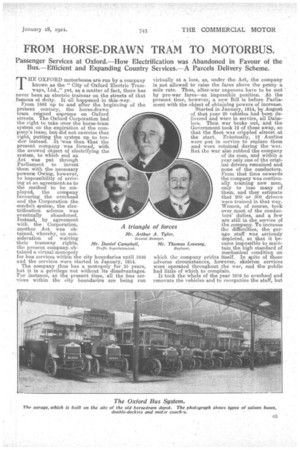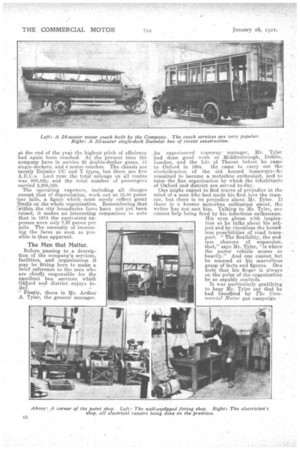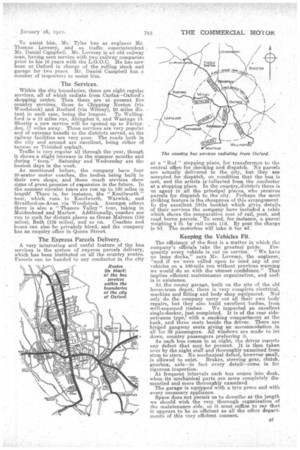FROM HORSE-DRAWN TRAM TO MOTORBUS.
Page 9

Page 10

Page 11

If you've noticed an error in this article please click here to report it so we can fix it.
Passenger Services at Oxford.—How Electrification was Abandoned in Favour of the Bus.—Efficient and Expanding Country Services.—A Parcels Delivery Scheme.
A triangle
Mr. Arthur General m
T. HE OXFORD motorbuses are run by a company known as the " City of Oxford Electric Tramways, Ltd.," yet, an a matter of fact, there has never been an electric tramcar on the streets of that famous ol deity. It all happened in this .way. From 1882 up to and after the beginning of the present century, the horse-drawn tram reigned supreme on' Oxford streets. The Oxford Corporation had the right to take over the horse-tram system on the expiration of the cornpany's lease, but did not exercise that right, putting the system up to tendes instead. at Jwas then that the present company was formed, with the avowed object of electrifying the system, to which end an Act was put through Parliament to invest them with the necessary powers! Owing, however, to impossibility of arriving at an aAgreenient.ae to the method to be employed, the company favouring the overhead and the Corporation the conduit system.' the electrification scheme was eventually abandoned. Instead, by agreement with the Corporation, another Act was obtained, whereby, on consideration of waiving their tramway rights, Mr. Daniel Campbell, the present company_ ohTraffic 2uper4ntendent. tamed a virtual monopoly
for bus services within the city boundaries until 1949 and. the services were started in January, 1914.
The company thus has a monopoly for 35 years, but it is a privilege not without its disadvantages For instance, at the present time, -all the bus services within the city boundaries are being run
virtually at a loss, as, under the Act, the company is not allowed to raise the fares above the penny a mile rate. Thus, after-war expenses have to be met by pre-.war fares—an impossible position. At the present time, however, a new Bill is before Earlier. ment with the object of obtaining powers of increase. Started in January, 1914, by August of that year 28 vehicle's had been delivered and were in service, all Daimlers. Then war broke out, and the Government took 12 of these away, so that the fleets was crippled almost at the start. Eventually, 12 Anstins were put in service to replace them and were retained during the War. But the war also robbed the company of its men, and within a year only one of the original drivers remained and none of the conductors. From that time (Inwards the company was continually training new men, only to lose many of them, and they estimate that 200 or 300 drivers were trained in that way. Women, of course, took over most of the conductors' duties, and a few are still in the service of the company. To increase the difficulties, the gar
A. Tyler, age staff wan seriously (Imager. depleted, so that it be Hr. Thomas Lovesey, came impossible to main
tain the high standard of mechanical condition on which the company prides itself. In spite of these adverse circumstances, however, skeleton services were operated throughout the war, and the public had little of which to complain. It took the whole of the year 1019 to overhaul and renovate the vehicles and to reorganize the staff, but
at the end of the year the highest. pitch of efficiency had again been reached. At the present time the company have in service 23 double-decker guses, 13 single-deckers, and 4 motor coaches, The chassis are mostly Daimler CC and Y types, but there are five A.E,C.s. Last year the total mileage on all routes was 930,19.and the total number of passengers carried 8,208,108. The °aerating expenses, including all charges except that or depreciation, work out at 16.50 pence per mile, a figure which must surely reflect great Oedit on the whole organization. Remembering that ;Within,the city boundaries fares have not yet been . raised, it makes an interesting comparison to note that in 1915 the equivalent ekpoises were only 7.37 pence per mile. The necessity of increasing the fares as soon as possible is thus apparent.
The Men that Matter.
Before. passing to a description of the company's services, facilities, and organization it may be fitting here to make a brief reference to the, men who are chiefly responsible for the evellent bus services which Otford and district enjoys to., day.
'1.Firstly, there is Mr. Arthur A. Tyler, the general manager. An experienced tramway • manager, Mr. Tyler had done good work at Middlesbrough, Dublin, London, and the Isle of Thanet before ho came to Oxford in 1904. He came to carry out the:. electrification of the old horsed tramways—he remained to become a motorbus enthusiast, an to raise the fine organization by which • the inhabitants of Oxford and district are served to-day.
One might expect to find traces of prejudice in the mind of a man who had made his first love the tramcar, but there is no prejudice about Mr, Tyler. If there is a keener motorbus enthusiast about, the
writer has not. met him. Talking to Tyler, one . cannot help being fired by his infectious enthusiasm. His eyes gleam with inspiration as he talks about his sub-' ject and he visualizes the boundless possibilities of road transport. " The flexibility, the endless chances of expansion, that," says Mr. Tyler, "is where . the motor vehicle scores so heavily." And one cannot but be amazed at his marvellous grasp of facts and figures. One feels that his finger is always on the pulse of the organization he so. capably controls.
It was particularly gratifying to hear Mr. Tyler say that he had fienefited by The Commercial Motor gas campaign. •
To assist him, Mr. Tyler has as engineer Mr. Thomas Lovesey, and as traffic superintendent . Mr. Daniel Campbell. Mr. Lovesey is an old railway man, having seen service with two railway companies prior to his 16 years with the L.G.O.C. He has now been at Oxford in charge of the rolling stock and garage for two years. Mr. Daniel Campbell has a number of inspectors to assist him.
The Services.
Within the city boundaries, there are eight regular services, all -of which radiate from Carfax—Oxford's shopping centre. Then there are at present five oountry services, those to Chipping Norton (via Woodstock) and Burford (via Witney), 20 miles distant in each case, being the longest. To. Wallingford is a 15 miles run, Abingdon 8, and Wrintage 18. Shortly a new service will be opened up to Faringdon; 17 miles away. These services are very popular and of extreme benefit to the districts served, as the railway facilities are very poor. The roads both in the city and around are excellent, being either of tarmac or Trinidad asphalt.
Traffic is very regular all through the year, though it shows a slight increase in the summer months and during "term." Saturday and Wednesday are the busiest days in the week.
As mentioned before, the company have four 28-seater motor coaches' the bodies being built in their own shops, and these coach services show signs of great promise of expansion in the future. In the summer circular tours are run up to 130 miles in lengtlt There is, for instance, the " Kenilworth " tour, which runs to Kenilworth, Warwick, and Stratford-on-Avon via Woodstock. Amongst others there is also a "Thames Valley" tour, taking in Maidenhead and Marlow. Additionally, coaches are run to such far distant places a-s Great Malvern (130 miles), Bath (132 miles), and so on. Coaches and buses can also be privately hired, and the company has an enquiry office in Queen Street.
The Express Parcels Delivery.
A very interesting and useful feature of the bus services is the system of express parcels delivery, which has been instituted on all the country routes. Parcels can be handed to any conductor in the city at a " Red " stopping place, for transference to the central office for checking and dispatch. No parcels are actually delivered in the city, but they axe accepted for dispatch, on condition that the bus is met, and the article is collectedfrom the conductor at a stopping place. In the countqadistricts there is an agent in all the principal place, who receives parcels for dispatch to the city. Perhaps the most striking feature is the cheapness of this arrangement. In the excellent little booklet which gives, details of their services the company have included a table which shows the comparative cost of rail, ,post, and road borne parcels. To send, for instance, a parcel weighing 2 lb. by rail costs lid. By post the charge is 9d. The motorbus will take it for 4d.
Keeping the Vehicles Fit.
The efficiency of the fleet is a Matter in which the
company's officials take the greatest pride. Frequently every vehicle is out on service. "We have no la-me ducks," says Mr. Lovesey, the engineer, "and if we were called upon to send any of our vehicles on a 100-mile run without previous warning we would do so with the utmost confidence." That implies efficient maintenance organization, and such is in existence: At. the roomy garage, built on the site of the old horse-tram depot, there is very complete electrical, machine and fitting and body shop equipment. Not only do the -company carry out all their own body repairs, but they also build excellent -bodies, from
well-seasoned timber. We inspected an excellent single-decker, just completed. It is of the rear sideentrance type, with a smoking compartment at the back, and three seats beside the driver. There are hinged gangway seats giving an accomnaoclation in all for 32 passengers. All windows a-re made to let down, country passengers preferring it. As each bus comes in at night, the driver reports any defect that may be present. It is then taken over by the night staff and thoroughly examined from stem to stern. No mechanical defect, however small, is allowed to exist. Brakes, steering gear, clutch, gearbox, axle—in fact every detail-'-come in for rigorous inspection. At frequent intervals each bus comes into dock, when its mechanical parts are more completely dismantled and more thoroughly examined.
The garage is equipped with a tyre press and with every necessary appliance. Space does not permit us to describe at -the length we should wish the very thorough organization of the maintenance side, so it must snfaoe to say that it appears to be as efficient as all the other depart. ments of this very efficient concern.
































